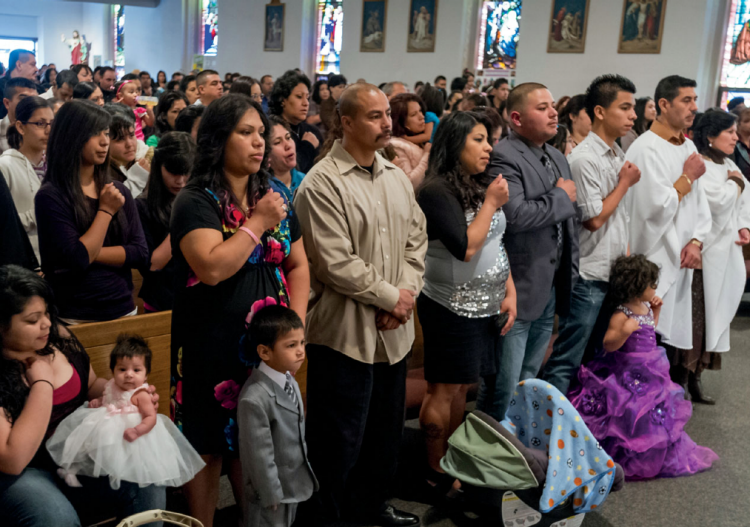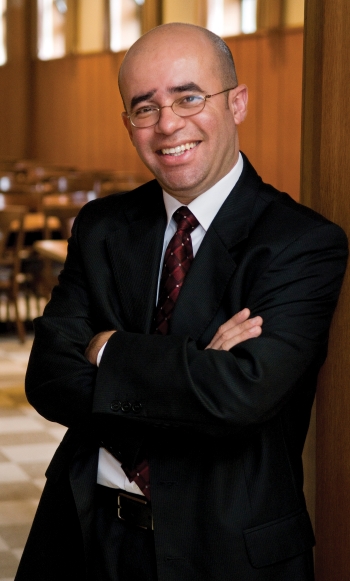
By
The explosive growth of Hispanic Catholics in America has exceeded the Catholic Church’s ability to adequately serve this population. Without a strategic response, the Church risks alienating an ethnic group crucial to its future, according to a landmark study of Hispanic Catholic parishes by School of Theology and Ministry Assistant Professor Hosffman Ospino.
Hispanics comprise 31.2 million of America’s 78 million Catholics and their growing ranks are rapidly transforming parishes in fundamental ways, according to the National Study of Catholic Parishes with Hispanic Ministry.
“Reflecting on the difficult experiences leading to closures and mergers in many dioceses, some have predicted the death of the parish in America,” said Ospino, the lead author of the report and an authority on pastoral ministry and religious education. “But this is premature. Parish life in several parts of the country is flourishing, in many because of Hispanics. If we fail to meet the needs of Hispanic Catholics and the parishes that serve them, then the parish structure in America will likely experience a dramatic decline as it did in Europe.”
The burgeoning Hispanic Catholic community is challenging parishes in areas of education, language, geography and ministry, according to Ospino.

There are 4,368 Catholic parishes with some form of organized ministry to Hispanics – accounting for nearly one in every four Catholic parishes in the US. But these parishes, led predominantly by non-Hispanic white priests and pastoral leaders nearing retirement age, will see leadership turnover at a higher rate than the wider Church, Ospino said. The survey points to a need for programs to prepare Hispanic and non-Hispanic priests and church leaders for Hispanic ministry.
“A new generation of Hispanic leaders in the Church is emerging,” said Ospino. “The question is: Is the Catholic Church ready to recognize them and support them? Will current structures of the American Catholic Church allow them to succeed? As it stands now, we still have a long way to go.”
The study found the demand for services at parishes with Hispanic ministry exceeds available resources. By comparison, Ospino noted, the 20 million Hispanic immigrants currently living in the United States is already four times the total number of Irish immigrants to the US from 1840 to 1960. The Church needs to shift gears and serve this predominantly Catholic group in the US as a non-negotiable priority or risk alienating them, Ospino said.
“The secularization of Hispanics is perhaps the biggest threat to the future of the Catholic Church in America,” said Ospino. “Only 3 percent of Hispanic Catholic children attend Catholic schools and fewer and fewer Hispanics under 30 attend church. We run the risk of losing a whole generation of Catholics.”
Yet pastoral leaders serving Hispanic Catholics continue to oversee their ministry with few resources. Parishes with Hispanic ministry as well as dioceses need to assign the highest priority to the development of sound strategies to invest in the evangelization of Hispanic Catholics, Ospino noted.
The changes are shifting the geographic balance of influence for the Church in America, according to the study, conducted in collaboration with the Center for Applied Research in the Apostolate at Georgetown University.
While 61 percent of all Catholic parishes are currently located in the Midwest and Northeast, the fast-growing Hispanic population is taking hold in the South and West, where 61 percent of parishes with Hispanic ministry are now located. The Midwest and Northeast are home to just 39 percent of churches with Hispanic ministry.
The findings point to a need for Church leadership in America to recognize the distinct needs of parishes with Hispanic ministry and to shift personnel and resources accordingly.
“About one in five pastoral leaders serving Hispanic Catholics in major ministerial positions in parishes and dioceses are unpaid,” said Ospino. “While clergy and vowed religious count on established support networks, a significant number of these unpaid leaders are lay women and men. Parishes and dioceses need to urgently attend to questions of fair compensation and parity with non-Hispanic ministries.”



